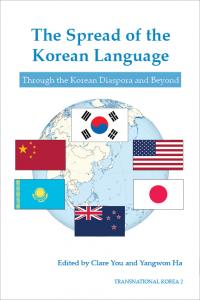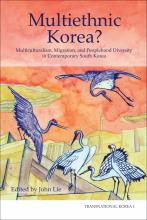The Spread of the Korean Language
The Spread of the Korean Language
Clare You, ed., Yangwon Ha, ed.
This volume of essays examines the development of Korean language education in expatriate Korean communities, and the role that the Korean government has played in the spread of the Korean language abroad. Through investigations of the history of Korean language education in China, Japan, Kazakhstan, New Zealand, and the United States, the contributors show how the teaching and learning of Korean has sustained diasporic Korean communities and allowed people of a non-Korean background to explore and understand Korean society and culture.
As a nonprofit academic press, we need your support to publish our books. Your gift can help us make more of our titles available as e-books. DONATE NOW
Title information
This volume of essays examines the development of Korean language education in expatriate Korean communities, and the role that the Korean government has played in the spread of the Korean language abroad. The ten contributors to this volume explore the dynamics of Korean language education in maintaining a sense of Korean identity in expatriate communities in China, Japan, Kazakhstan, New Zealand, and the United States. They also give an overview of the history of teaching Korean to people of non-Korean backgrounds in these countries, and of how this history has both derived from and amplified the recent increase overseas in Korean pop culture.
Contributors:
Yangwon HA is a researcher affiliated with the University of Washington, Seattle. She studied the sociology of education for her Ph.D. at the School of Education, University of California, Berkeley. Her major area of research is the expansion of education and Korean educational policy. She is also interested in the education of Korean American immigrants in the United States, and she coedited Traces of Early Korean Immigrants’ Education (Seoul: Sunin Press, 2011). She is currently working on a manuscript on the hierarchization of higher education in Korea since the liberation in 1945. Ha has served as a reporter specializing in education for Joongang Daily in Seoul and as program director of the Center for Korean Studies, University of California, Berkeley.
JIN Jiaoling has an M.A. in Korean literature and is a lecturer of Korean language at Harbin Institute of Technology. Her research focuses on modern Korean literature and the comparative study of Chinese and Korean literature. She coauthored with Jin Zhe an article titled “Discussion on Korean Female Characters of Modern Chinese Writers’ Works” in Dangdai Hanguo (Contemporary Korea, 2015), which illustrates the value of North Korean women’s images in modern Chinese literature based on the sociocultural background between 1910 and 1945.
JIN Zhe is a professor and Ph.D. supervisor of Korean literature at Shandong University. Currently director of the China Korean Language Society and a board member of several other national and international academic organizations of Korean studies, his research interests cover Korean literature and Korean language teaching. He has published several books including Pak Che-Ga’s Poetry and Chinese Literature (Shandong University Press, 2007) and Modern China-Korea Literary Relations in the Early Twentieth Century (Beijing: Minzu chubanshe, 2013), as well as over thirty articles, among them “The Past, Present, and Future of Korean Language Education in China,” in Zhong-Han renlei yanjiu (Korean-Chinese humanities research) 24 (2008), and “The Past, Current, and Future Tasks of Korean Cultural Education in China,” in Hanguoyu wenhua yanjiu (Korean language culture research) 1 (2013).
Hyewon KANG KIM is the director of the Cultural Studies Centre of East Asia in Hong Kong and the founder of the Korean studies programs at the University of Hong Kong and at the Community College of City University of Hong Kong. She is the author of Zhong Han wenhua tan 中韩文化谈 (Peking University Press, 2013), which was selected as the Phoenix New Media's Great Book (Fenghuang hao shu bang), and Dim Sum euro jeomsim meokki 딤섬으로점심먹기 (Korea University Press, 2013), which was selected for the Sejong doseo prize in the social science category by the Korean Ministry of Culture, Sports, and Tourism. She also authored Busy Koreans (Korea University Press, 2014), which is the first English publication on contemporary Korean culture and society written from an East Asian perspective. Her most recent book, Hankuk munhwaui tal Jungkukhwa 한국문화의탈중국화 (Somyung Publishing, 2018), discusses the linguistic culture and the ways of thinking of Koreans compared to Chinese. She has published numerous articles on cultural phenomena and films, as well as academic studies on Korean language and culture. As an invited scholar, she has regularly written articles on liberal arts for the Maeil Business Newspaper. She holds a Ph.D. in Korean studies from Kyung Hee University, and master's and bachelor's degrees from Yonsei University.
German KIM is director of the International Center of Korean Studies, Kazakh National al-Farabi University, and professor in the Department of History, Konguk University. He has written and edited a large number of books and papers, originally in his native Russian, but translated into Kazakh, English, Korean, German, and Japanese. His most significant books are The History of Korean Immigration, vol. 1, Second Half of the Nineteenth Century-1945 (Almaty: Daik- Press, 1999), The History of Korean Immigration, vol. 2, 1945-2000, parts 1 and 2 (Almaty: Daik-Press. 2006), The Koryo Saram: Historiography and Bibliography (Almaty: Kazakh universiteti, 2000), and Ethnic Entrepreneurship of Koreans in the USSR and Post-Soviet Central Asia, (Institute of Developing Economics Visiting Research Scholars Monograph Series 446, 2008). Kim has received research and fieldwork grants from the Korea Research Foundation, Korea Foundation, British Academy, Japan Museum of Anthropology (Osaka), International Research and Exchanges Board, Academy of Korean Studies, POSCO (Pohang Iron and Steel Company) Foundation, Institute for Developing Economics (Japan), and the North East Asia History Foundation. As a visiting professor, he has taught in the Institute of Humanities at the University of Michigan, Ann Arbor, the Center for Slavic Studies at Hokkaido University (Sapporo), Sungshin University (Seoul) and Konguk University (Seoul). For his academic, educational, and social efforts, Kim has received numerous Kazakh and Korean awards, including the Korean Compatriots Award of KBS for 2014 in the humanities and social sciences.
Nam Sun SONG is professor of linguistics in the Faculty of International Studies at the Osaka University of Economics and Law. Song received his Ph.D. in linguistics at the School of Oriental and African Studies, University of London. He is the author of Thematic Relations and Transitivity in English, Japanese, and Korean (University of Hawai'i Press, 1993), "Metaphor and Metonymy" in Robyn Carston and Seiji Uchida, eds., Relevance Theory: Applications and Implications (John Benjamins Publishing, 1998), and "Passives" in Jaehoon Yeon, ed., Studies in Korean Morpho-Syntax: A Functional-Typological Perspective (Saffron Korean Linguistics Series 2, 2003). He has published numerous articles on Korean and Japanese grammar and linguistics. His recent research focuses on the history of Korean language education in Japan and linguistic nationalism in Japan and Korea.
Hye-Sook WANG is an associate professor of East Asian studies at Brown University. Her primary research interest is in sociolinguistics and cross-cultural communication. In recent years, her publication has been on curriculum development, the integration of language and culture, and the pragmatic/sociolinguistic aspects (e.g., gender and politeness) of learning Korean as a foreign language. She most recently edited Rise of Korean Language Programs in U.S. Institute of Higher Education (Korea University Press, 2015). She served as the editor-in chief of Korean Language in America, the journal of the American Association of Teachers of Korean, from 2005 to 2012.
Inshil Choe YOON is a senior lecturer in the School of Cultures, Languages, and Linguistics at the University of Auckland. She wrote on the bibliographical background of T'aengniji manuscripts and translated T'aengniji into English. A Place to Live: A New Translation of Yi Chung-hwan's T'aengniji, the Korean Classic for Choosing Settlements, is fothcoming from the University of Hawai'i Press. She has also studied children's learning the Korean language in an English-speaking environment. Time for Korean (Hollym 2009), a revised version of Nami annyong, is one of the outcomes of this research.
Clare YOU studied linguistics and information science at the University of California, Berkeley. She taught and coordinated the Korean program as well as served as chair of the Center for Korean Studies. You coauthored College Korean and Intermediate College Korean (University of California Press, 1992 and 2002). She has cotranslated modern Korean poetry and fiction into English, including The Three Way Tavern (University of California Press, 2006) and I Must Be the Wind (White Pine Press, 2014), and English works into Korean, such as Things Fall Apart (Seoul: Eastern Press, 1994). She is a recipient of the Order of Cultural Merit (Silver Medal) from the Government of Korea. More recently, she was awarded the Manhae Grand Prize in Korea (2017).
Clare You, ed.
The Spread of the Korean Language (TK 2)
Acknowledgments
Contributors
Introduction
Clare You
1. Establishment and Development of Korean Language in China
Kim Kuang-su and Ma Chun-ok
2. How Korean Language Education Spread in Shandong, China
Jin Zhe and Jin Jiaoling
3. The Spread of Korean Language Education in Hong Kong
Hyewon Kang Kim
4. From a Diaspora Language to a Language Diaspora: The Social Implications of Korean Language Education in Japan
Nam Sun Song
5. The Perishing Language of Diaspora: the Case of koryomal in Kazakhstan
German Kim
6. Korean Language Spread and Korean Language Education in New Zealand: With Comparative Notes on Australia
Inshil Choe Yoon
7. On the Korean Language in Diaspora - Focusing on the Western United States
Clare You
8. The Korean Language Diaspora: With a Special Focus on the Eastern United States
Hye-Sook Wang
9. Language Spread Policy in Korea
Yangwon Ha


